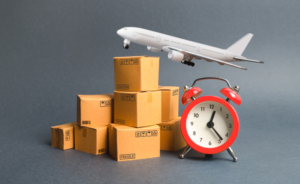What is Section 321? It is a provision in the U.S. Customs and Border Protection (CBP) regulations that allows for the duty-free importation of low-value shipments. This exemption was put in place to streamline cross-border e-commerce and reduce barriers for businesses engaging in international trade.
Section 321 expedites customs clearance and reduces costs for shipments valued at US$800 or less. This provision benefits businesses by simplifying import procedures and enhances the overall customer experience by enabling faster and more affordable delivery of goods.
Let’s explore Section 321 in greater detail.
Benefits of Section 321
Section 321 is particularly beneficial for businesses engaged in e-commerce and cross-border trade, where low-value shipments are common. By simplifying customs clearance for these shipments, Section 321 offers a range of advantages:
- Lower Costs: The duty-free exemption translates to direct cost savings for businesses, allowing them to offer more competitive pricing or increase profit margins.
- Faster Shipping: Expedited customs clearance under Section 321 leads to faster delivery times, improving customer satisfaction and reducing inventory holding costs. Imports that qualify for Section 321 treatment bypass the need for a CBP Form 7501 entry summary or other types of documentation typically required for formal entries, streamlining the process and getting goods to market faster.
- Simplified Documentation: The process involves less paperwork compared to traditional import procedures, saving time and resources for businesses.
- Enhanced Profitability: The combination of cost savings, faster shipping, and simplified processes contributes to improved operational efficiency and ultimately, enhanced profitability for businesses.
Section 321 De Minimis Rule & Eligibility Criteria
To leverage the benefits of Section 321, shipments must meet specific eligibility criteria set by US customs. The core requirement is the de minimis value limit, which stipulates that the total value of goods in a single shipment must not exceed US$800.
Additionally, the de minimis rule mandates that the shipment:
- Must be imported by one person on one day.
- The duty exemption applies on a per-shipment basis, not per importer.
It’s also important to be aware of exceptions to Section 321. If your shipments contains any of the following imports, your shipment is not eligible to benefit from Section 321:
- Alcohol and tobacco products
- Items subject to Anti-Dumping and Countervailing Duties (ADD/CVD)
- Goods subjected to specific import restrictions or quotas
Claiming Section 321 for E-commerce Shipments
While Section 321 can expedite the customs clearance process, there are specific procedures you must follow to ensure compliance and avoid potential issues at customs. Let’s break down the key steps:
1. Make Sure Your Shipment is Eligible
- Verify that the total value of your shipment does not exceed the US$800 Section 321 de minimis threshold.
- Confirm that the goods being imported are not among the excluded items, such as alcohol, tobacco, or those subject to specific restrictions.
2. Make Sure Everything is Labeled Clearly
- Your shipment should be clearly marked as “Section 321” on the commercial invoice and on all relevant shipping documents. This clear indication alerts customs officials to your intent to utilize the exemption.
3. Ensure Everything is Documented Accurately
- Include accurate Harmonized Tariff Schedule (HTS) codes for all goods in the shipment. HTS codes are essential for classifying goods and determining applicable duties and taxes, even when they are exempt under Section 321.
- Make sure that your carriers provide the advance electronic data (AED) about your shipment to the U.S. Customs and Border Protection (CBP), consisting of shipment contents, value, and consignee details. AED allows CBP to assess risk and make informed decisions about clearance, expediting the process for compliant shipments.
- Ensure the shipment is included in the carrier’s manifest and transmitted to CBP before arrival. The manifest provides a comprehensive overview of the shipment’s contents, facilitating efficient processing and verification by customs officials.
4. Type 86 Entry
Section 321 shipments typically enter the U.S. under Type 86 entry, a streamlined process specifically designed for low-value goods. This entry type allows carriers and customs brokers to expedite processing, reducing clearance times and facilitating the swift movement of goods.
However, it’s crucial to note that U.S. Customs and Border Protection (CBP) has recently intensified its scrutiny of Type 86 shipments. This heightened enforcement aims to combat the illicit trade of narcotics, counterfeit goods, and products made with forced labor, which can sometimes exploit the Section 321 de minimis provisions.
In May 2024, CBP announced that it was enhancing its enforcement efforts to ensure that all Entry Type 86 Test participants are held accountable for compliance with Section 321 requirements. This move included suspending several customs brokers whose entries were deemed to have an unacceptable level of compliance risk. CBP clarified that these actions are part of a broader strategy to prevent abuse of the de minimis process from misuse, protect the integrity of the supply chain, and ensure that businesses comply with the legal requirements within the USA.
As a result, shipment data must now be filed prior to or on arrival of the imported cargo. Previously, filing could take place up to 15 days after the arrival of the shipment.
To ensure compliance and navigate this evolving landscape, businesses should consider partnering with a customs broker or utilizing software solutions specializing in Section 321 fulfillment. These experts possess the knowledge and tools to ensure compliance, minimize risks, and help your shipments clear Section 321 customs efficiently, even amidst increased scrutiny.
Simplify Section 321 Fulfillment & Customs Clearance with CrimsonLogic
Navigating the complexities of Section 321 and Type 86 entry doesn’t have to be overwhelming. CrimsonLogic offers tailored solutions to streamline your Section 321 fulfillment process, whether you prefer self-filing or comprehensive assistance.
Our e-commerce customs clearance software empowers customs brokers to efficiently self-file and clear US e-commerce shipments in a single filing. Accelerate and streamline Section 321 Entry Type 86 filing and compliance workflows while managing bulk parcel customs clearance with cost savings of up to 30% compared to traditional express companies.
For customers seeking additional support, CrimsonLogic’s expert team is ready to assist with filing, handling large-volume submissions with ease. We facilitate the shipment of up to a million parcels daily into the U.S., ensuring accurate manifests, proper valuation, and precise classification of goods. Should your shipments require special cargo handling and label printing, our team is equipped to manage those requirements seamlessly. With our e-commerce import solution, you can outsource with confidence, knowing your needs are in good hands.
Our extensive connectivity supports your e-commerce imports, and with our 24/7 customer service, you can rest assured that assistance is always available.





